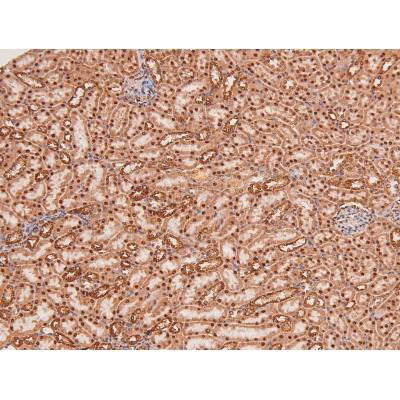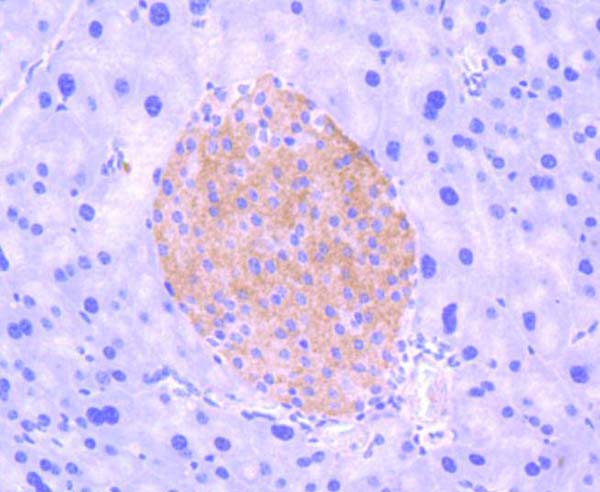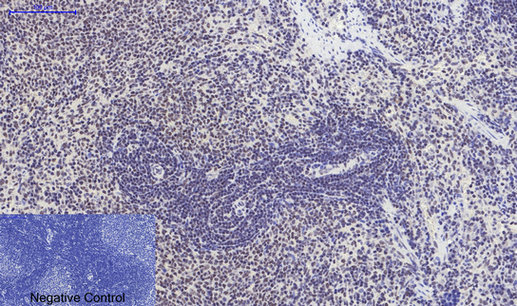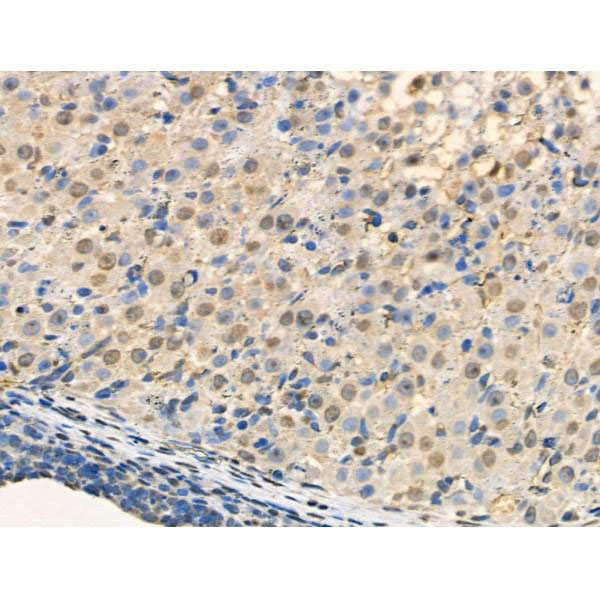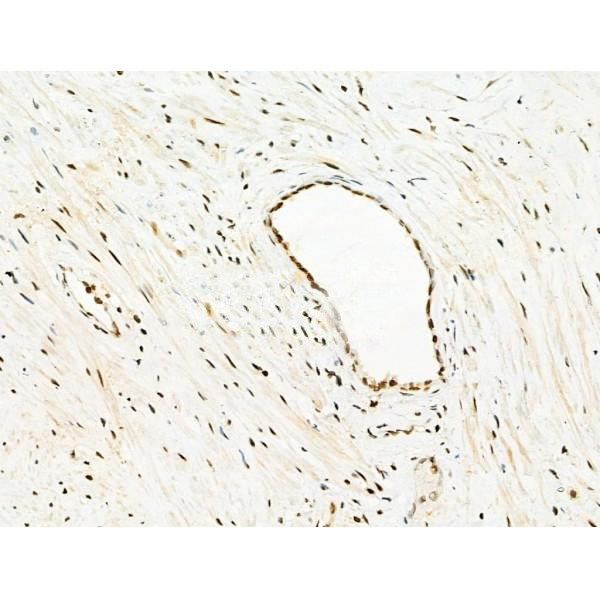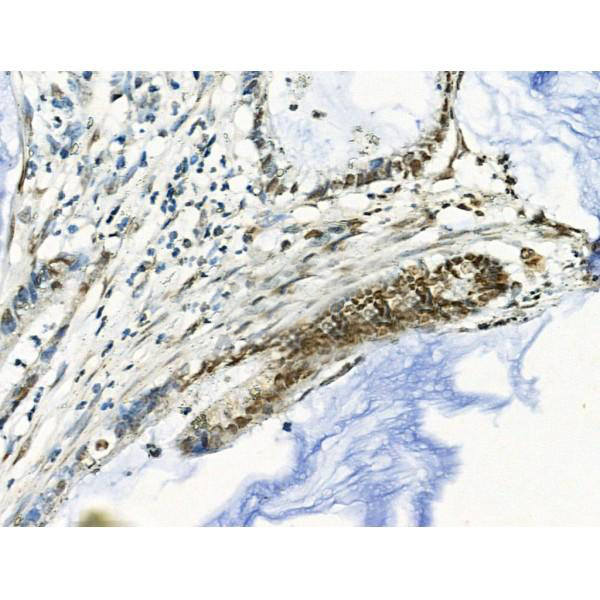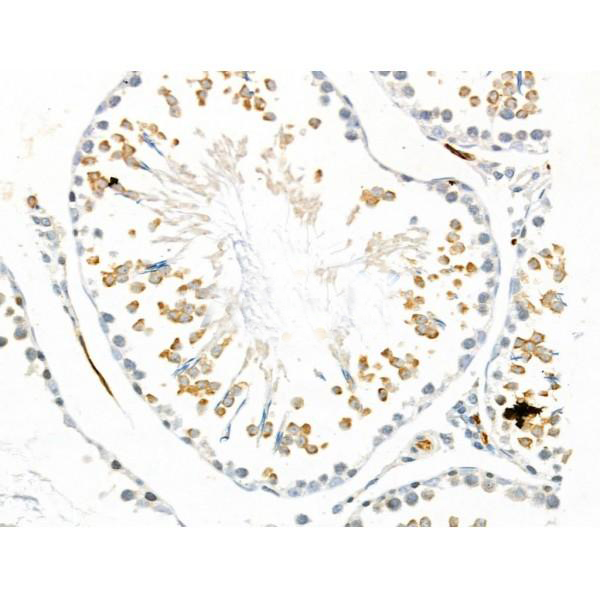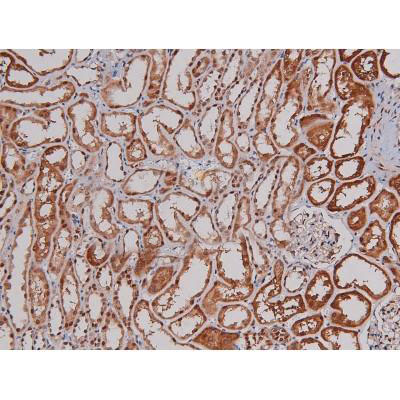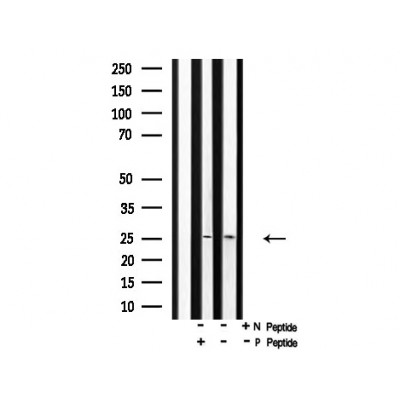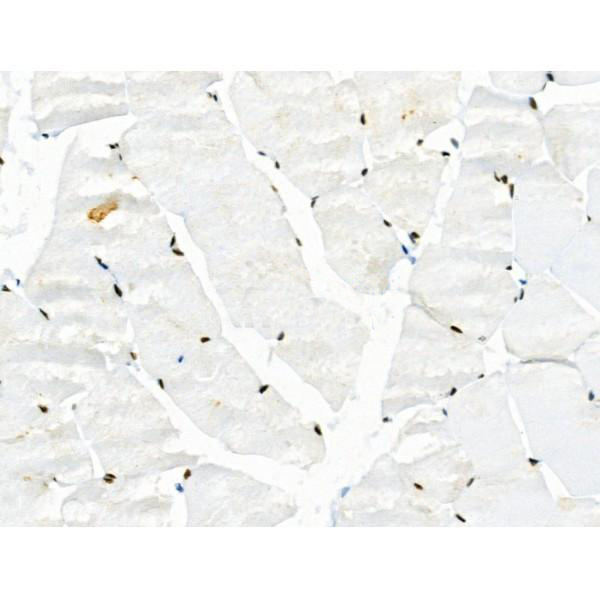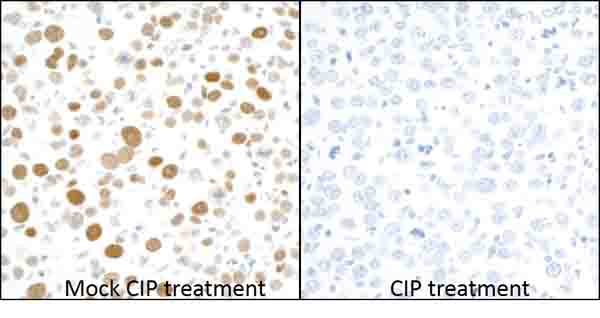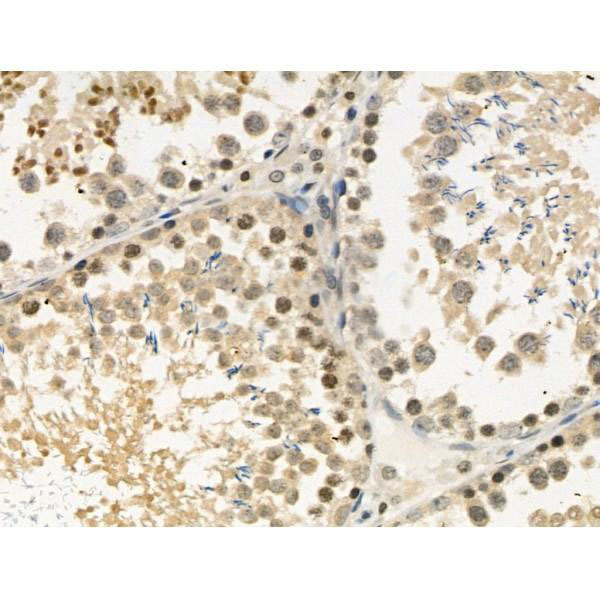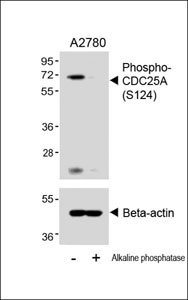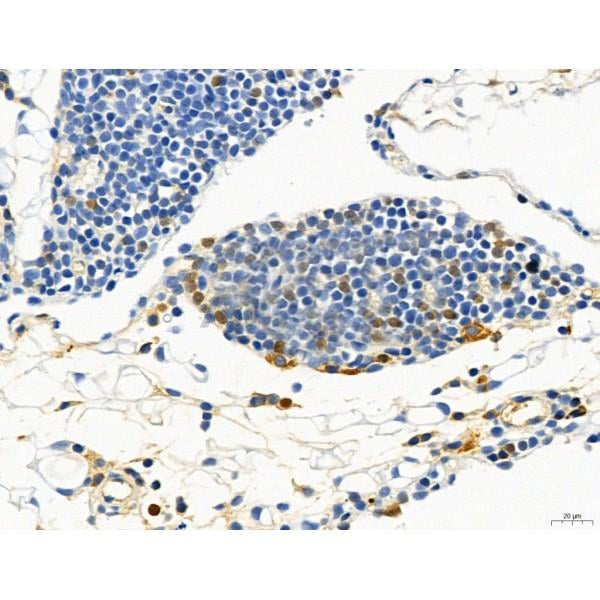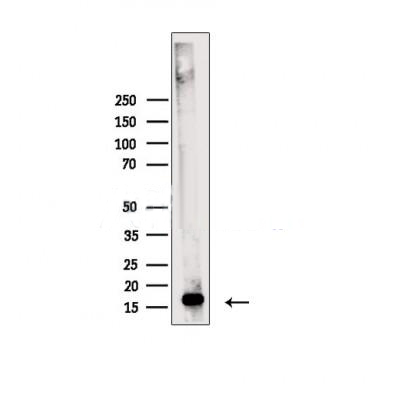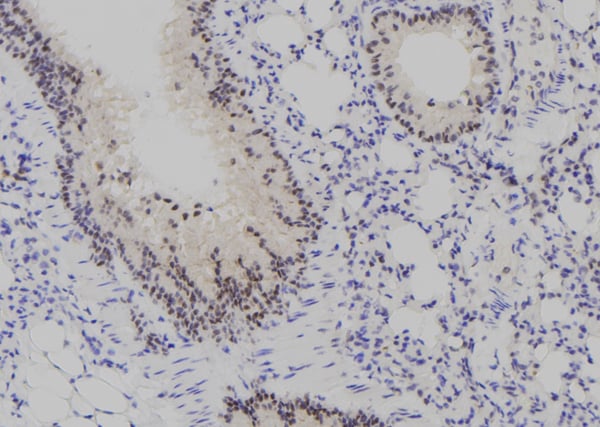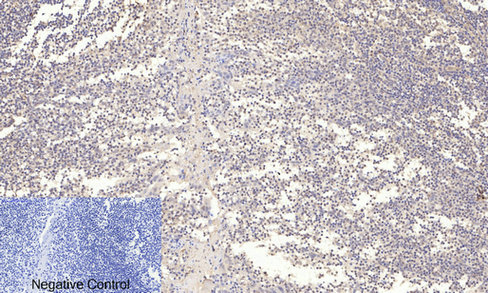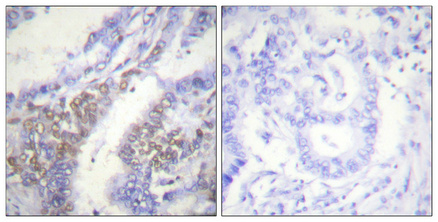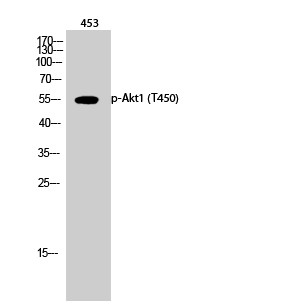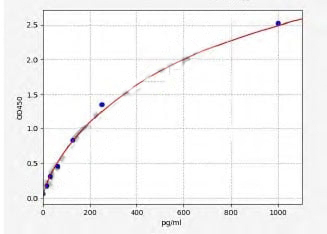Filters
▼Clonality
▼Type
▼Reactivity
▼Gene Name
▼Isotype
▼Host
▼Application
▼Clone
▼Phospho Antibodies
Phospho-specific antibodies’ typical purpose is to enable researchers to detect changes in proteins. They will exclusively bind to the amino acid sequence on a protein that has been phosphorylated (which is both a physical & chemical change) and do not bind to the same amino acid sequence on said protein if it lacks said phosphorylation. This aids in being able to clearly see and understand the data produced from this particular protein modification.
Viewing 200-250 of 5299 product results
Mnk1, Polyclonal Antibody (Cat# AAA31406)
Predicted Reactivity: Pig (100%), Zebrafish (100%), Bovine (100%), Horse (100%), Sheep (100%), Rabbit (100%), Dog (100%), Chicken (100%), Xenopus (100%)
ENO3, Monoclonal Antibody (Cat# AAA25679)
CDK5, Polyclonal Antibody (Cat# AAA31445)
Predicted Reactivity: Zebrafish (100%), Bovine (100%), Horse (100%), Sheep (100%), Rabbit (100%), Dog (100%), Chicken (100%), Xenopus (100%)
MCM2, Polyclonal Antibody (Cat# AAA31328)
NDEL1, Polyclonal Antibody (Cat# AAA31462)
Predicted Reactivity: Pig (100%), Bovine (100%), Horse (100%), Sheep (100%), Rabbit (100%), Dog (100%), Chicken (100%), Xenopus (100%)
Bcl-2, Polyclonal Antibody (Cat# AAA31360)
Predicted Reactivity: Pig (86%), Bovine (83%)
IRS1, Polyclonal Antibody (Cat# AAA31366)
Predicted Reactivity: Pig (100%), Zebrafish (100%), Bovine (100%), Horse (100%), Sheep (100%), Rabbit (100%), Dog (100%)
TrkB, Monoclonal Antibody (Cat# AAA29783)
MOB1A, Polyclonal Antibody (Cat# AAA31161)
Predicted: Bovine, Horse, Sheep, Rabbit, Dog, Xenopus
p38, Polyclonal Antibody (Cat# AAA28937)
CAMKK1/2, Polyclonal Antibody (Cat# AAA31402)
Predicted Reactivity: Pig (100%), Bovine (100%), Sheep (100%), Rabbit (100%), Dog (100%), Chicken (100%), Xenopus (100%)
JAK3, Polyclonal Antibody (Cat# AAA31404)
Predicted Reactivity: Bovine (100%), Sheep (100%), Dog (100%)
EEF1A2, Polyclonal Antibody (Cat# AAA31289)
TOPBP1, Polyclonal Antibody (Cat# AAA31467)
Predicted Reactivity: Pig (100%), Zebrafish (80%), Bovine (100%), Horse (100%), Sheep (100%), Rabbit (100%), Dog (100%), Chicken (80%), Xenopus (80%)
eIF4B, Polyclonal Antibody (Cat# AAA31302)
EIF2S2, Polyclonal Antibody (Cat# AAA31456)
Predicted Reactivity: Pig (100%), Zebrafish (100%), Bovine (100%), Horse (100%), Sheep (83%), Rabbit (100%), Dog (83%), Xenopus (100%)
eIF4E, Monoclonal Antibody (Cat# AAA29779)
p27 Kip1, Polyclonal Antibody (Cat# AAA31387)
Predicted Reactivity: Bovine (89%), Sheep (89%), Rabbit (100%), Dog (100%), Chicken (89%)
JIP1, Polyclonal Antibody (Cat# AAA31318)
MCM2, Monoclonal Recombinant Antibody (Cat# AAA23835)
YB1, Polyclonal Antibody (Cat# AAA31294)
Phospho-CDC25A (S124), Polyclonal Antibody (Cat# AAA28653)
JunD, Monoclonal Antibody (Cat# AAA29784)
ERK 1/2, Polyclonal Antibody (Cat# AAA28926)
SRPK2, Polyclonal Antibody (Cat# AAA31293)
FAK, Polyclonal Antibody (Cat# AAA28953)
Phospho-Histone H3-S10/T11, Polyclonal Antibody (Cat# AAA28391)
JAK3, Polyclonal Antibody (Cat# AAA31405)
Predicted Reactivity: Pig (100%), Bovine (91%), Horse (100%), Sheep (100%), Dog (100%)
MLC2, Polyclonal Antibody (Cat# AAA31471)
Predicted Reactivity: Horse (100%), Sheep (100%), Rabbit (100%), Dog (100%), Chicken (100%)
ENO3, Monoclonal Antibody (Cat# AAA25384)
Smad5, Polyclonal Antibody (Cat# AAA31331)
AML1, Polyclonal Antibody (Cat# AAA31153)
Predicted: Pig, Zebrafish, Bovine, Horse, Rabbit, Dog, Chicken, Xenopus
FRS2, Polyclonal Antibody (Cat# AAA31412)
Predicted Reactivity: Pig (100%), Bovine (100%), Horse (100%), Sheep (100%), Rabbit (100%), Dog (100%), Chicken (100%)
HBP1, Polyclonal Antibody (Cat# AAA31326)
CUTL1, Polyclonal Antibody (Cat# AAA31424)
Predicted Reactivity: Pig (100%), Sheep (100%), Dog (100%), Xenopus (100%)
Phospho-CAMP Response Element Binding Protein (pCREB), ELISA Kit (Cat# AAA18969)
Akt, Polyclonal Antibody (Cat# AAA28919)
AP-1, Polyclonal Antibody (Cat# AAA28921)
Phospho Tau (P181), ELISA Kit (Cat# AAA27564)
Akt1, Polyclonal Antibody (Cat# AAA28920)
ENO3, Monoclonal Antibody (Cat# AAA24498)
Src, Antibody (Cat# AAA17990)
phospho Tau Protein, ELISA Kit (Cat# AAA17648)
ERK 1/2, Polyclonal Antibody (Cat# AAA28925)
KAP-1, Monoclonal Recombinant Antibody (Cat# AAA23791)
FoxO3A, Polyclonal Antibody (Cat# AAA28927)
TGF beta Receptor I, Antibody (Cat# AAA18002)
Kv4.2/KCND2, Antibody (Cat# AAA18001)
CREB-1, Polyclonal Antibody (Cat# AAA28923)
ID2, Polyclonal Antibody (Cat# AAA31291)
What Are Phospho Antibodies?
Protein phosphorylation is a process where a phosphate group is added to certain amino acid residues of a protein – usually serine (S), threonine (T), or tyrosine (Y) - by enzymes called kinases. This process is integral in controlling cellular signaling, cellular growth, and other biological functions.
Our catalog includes a wide range of phospho-specific antibodies that can accurately detect this important marker. They perform strongly in widely-used laboratory applications such as Western blot, flow cytometry, immunohistochemistry, and immunofluorescence microscopy. We value your trust in us and are committed to providing top-quality products and services. All of our antibodies are guaranteed to work for the applications and species indicated on our website & associated product pages.
What Are The Key Applications of Phospho Antibodies?
1. Western Blotting
One of the first steps a researcher can take in utilizing these phospho-specific antibodies, is to check if the antibody works using a technique referred to as “Western blot”. For those unfamiliar, Western Blot aids in showing whether the protein that the antibody recognizes is appearing at the correct/expected size. These phospho-specific antibodies should also be able to detect changes in the target protein’s phosphorylation (on/off state) when cells are stimulated in certain ways.
2. Staining of Fixed Cells (Immunocytochemistry)
Another routine use of these phospho-specific antibodies, is to test if the antibody is able to demonstrate similar performance when used on fixed cells (intact cells that have been preserved) as it did in the Western blot tests. It is an important aspect in many cases to confirm that the antibody works in actual intact cell samples. Ideally, the method used for cellular fixation should be the same as what is used in pathology labs (like using 10% formalin). To check if the antibody works well in tissue sections (FFPE), researchers will often test it on fixed cells that are processed similar to tissue samples.
3. Specificity Tests Using Peptides
In order to make sure that the antibody is only binding to the right target:
- Laboratory technicians will mix the antibody with phospho-peptides (short segments of the protein containing the phosphate group modification).
- If the antibody signal disappears, it is confirmation that it is binding to the correct phosphorylated location.
- A more robust test is to use both the phosphorylated and non-phosphorylated (dephosphorylated) versions of the protein. The antibody should react only with the phosphorylated one.
- Another method sometimes utilized is to treat the sample with an enzyme, such as alkaline phosphatase, that specifically removes phosphate groups. If the antibody signal disappears after this, it also confirms specificity.
4. Genetic Confirmation
As a final step, scientists can genetically manipulate the nucleotide sequence and alter the target protein by removing the exact site where phosphorylation happens. If the antibody no longer appears to detect the modified protein, it is strong evidence supporting the antibody being specific for that phosphorylated site.
Why Buy Phospho Antibodies Through Us?
- The production laboratory adheres to strict and consistent protocols prior to releasing any of these phospho-specific antibodies:
- Standard methods and proper controls in all tests to ensure high quality.
- These antibodies are tested and validated in different cell types and species.
- High quality control criterion to ensure each batch is consistent, so you will obtain reliable results every time.
FAQ
1. What Are Phospho-Specific Antibodies?
Phospho-specific antibodies are made to detect proteins only when they have a phosphate group linked to a specific amino acid residue. This empowers scientists understand if a protein is "turned on" or active, based on its phosphorylation state.
2. How to Detect Phosphorylated Proteins in a Western Blot?
To find out if a protein is phosphorylated using Western blot:
- Use a phospho-specific antibody that binds only to the phosphorylated form of the protein.
- You can also use a “regular” antibody for the same amino acid sequence of the protein that the phospho-specific antibody is binding to (but in this case, this antibody will not bind if there is a phosphate group present) in order to compare how much of it is phosphorylated versus how much is non-phosphorylated (or “total” protein, if the “normal” antibody’s epitopes are non-phospho-site-specific).
3. How to Choose the Best Antibody?
Here are some simple tips to help you pick the right antibody:
- Know your target
- Match your sample characteristics
- Confirm the intended use is appropriate
- Check “host” and “type”
- Check the “quality” of the presented data/images
- Appraise whether the available validation meets your needs



